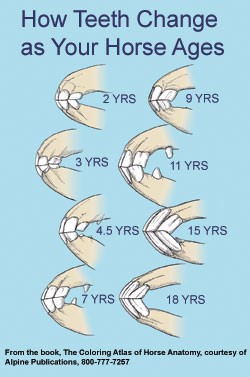HORSES` DENTAL PROBLEMS
By: Rodaina Moslem
A horse’s teeth is one of the most important things in a horse. Actually, we know how old a horse is through its teeth. Not only that, but also it is one of the most important things the horse’s veterinarian should examine. The veterinarian should examine in order to identify tooth breaks, gaps between teeth, cavities and any dental diseases. There are actually some issues and dental problems that may look small but will cause bigger problems later on.
Although middle-aged horses may sometimes have some dental problems, but the most horses with dental problems are the youngest and oldest horses.
Equine Odontoclastic Tooth Resorption and Hypercementosis (EOTRH) is a recently recognized disease that causes changes to tooth roots and surrounding gingiva (gums) in old horses. In some cases, it causes a long-lasting infection of the tissues which is very painful to the horse. The causes of this disease are still unknown. Also, there is no specific treatment till now to prevent or even slow the progression of this disease. In order to prevent it, the veterinarian must examine the horse every once in a while (at least one or two times per year) and if there are any teeth that are loose or painful, the veterinarian must be called immediately. This disease occurs mostly to horses older than 15 years. The two kinds of horses that are at risk to get that disease are Warmbloods and Thoroughbreds.
Sometimes the dental issues are unnoticed, but there are also some clinical signs that can tell the owner that their horse is having a dental problem. The signs are:
- If the horse is always dropping food while chewing, it sometimes means that the horse has loose teeth, a dental disease, distance/spaces between teeth, or masses in their mouth.
- If the horse suddenly stopped eating hay or grain and it’s a mid-aged horse (older than 5 years), it means it’s hard for it to chew because of loose teeth.
- Sometimes horses eat with their head tilted one side; they sometimes do that because one side of the horse’s mouth is in pain.
- If the horse is producing saliva more than normal this means the horse is in pain. They do it because they need a lubricant to make it easier for them to chew the food.
- Losing weight occurs sometimes due to dental problems. Especially in old horses.
Some of the problems that can occur to horses, especially the old ones, include:
- Losing teeth
- Infection
- Wave mouth
- Sharp points and hooks
- Food between teeth
- Spaces between teeth
- Equine odontoclastic tooth resorption and hypercementosis (EOTRH)
Sometimes a horse may have a hard mouth which causes it to pull 10 times harder anytime the rider puts pressure on the reins and is being stopped hardly. This may happen because the horse is experiencing some kind of pain or discomfort, and in that case the owner must go to the veterinarian. Also it may be because the horse is anxious, so it has to relax, or it’s because they learner to be hard-mouthed.
--END--



